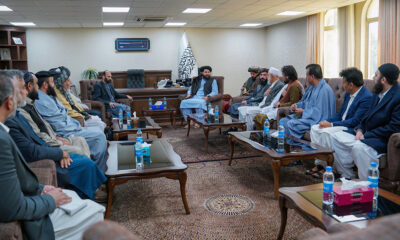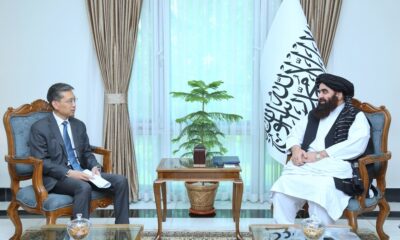Latest News
US moves Kabul embassy to Doha, Blinken tells House Committee

US Secretary of State Antony Blinken said on Monday night that Washington has moved its diplomatic operations from Kabul to Doha and that it remains focused on counterterrorism efforts in the region.
Addressing the House Committee on Foreign Affairs, Blinken said: “We moved our diplomatic operations from Kabul to Doha, where our new Afghan affairs team is hard at work. Many of our key partners have joined us there.”
He also stated that the Islamic Emirate of Afghanistan has committed to prevent terrorist groups from using Afghanistan as a base for external operations that could threaten the United States or its allies, including al-Qaeda and ISIS-K (Daesh).
“We’ll hold them accountable for that. That does not mean we will rely on them. We will remain vigilant in monitoring threats, we’ll maintain robust counterterrorism capabilities in the region to neutralize those threats if necessary – and we do that in places around the world where we do not have military forces on the ground,” he said.
He also said that the US continues its intensive diplomacy with allies and partners.
“We initiated a statement joined by more than half the world’s countries – over a hundred countries – as well as a United Nations Security Council resolution setting out the international community’s expectations of a Taliban-led (Islamic Emirate) government.
“We expect the Taliban (Islamic Emirate) to ensure freedom of travel; to make good on its commitments on counterterrorism; to uphold the basic rights of the Afghan people, including women, girls, and minorities; to name a broadly representative permanent government; to forswear reprisals.
“The legitimacy and support the Taliban (Islamic Emirate) seeks from the international community will depend on its conduct,” he said.
Blinken said he led a ministerial meeting of 22 countries, NATO, the EU, and the United Nations, to continue to align efforts on Afghanistan.”
This comes just hours after the US announced it is providing nearly $64 million in new humanitarian assistance to the people of Afghanistan to meet critical health and nutrition needs.
This additional funding means the United States has provided nearly $330 million in assistance to the Afghan people this fiscal year.
Blinken also gave a full report back on the US troops withdrawal process from Afghanistan and the evacuation process and said the emergency evacuation was sparked by the collapse of the Afghan security forces and government.
“Throughout the year, we were constantly assessing their staying power and considering multiple scenarios. Even the most pessimistic assessments did not predict that government forces in Kabul would collapse while US forces remained.
Quoting General Mark Milley, the Chairman of the Joint Chiefs of Staff, Blinken said: “Nothing I or anyone else saw indicated a collapse of this army and this government in 11 days.”
Latest News
Russia’s special envoy meets with IEA ministers, discusses bilateral issues
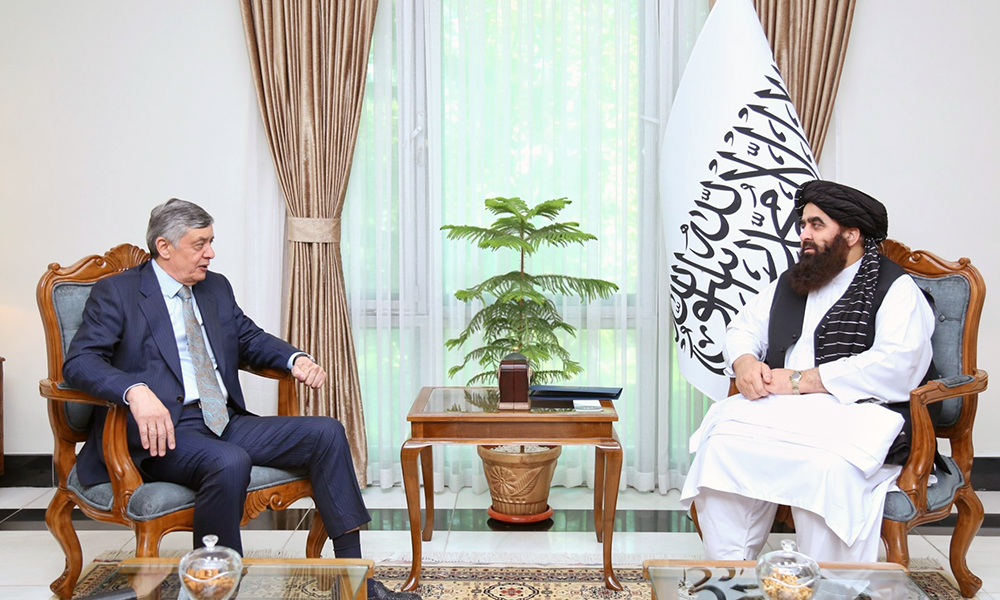
Zamir Kabulov, the Special Representative of the President of the Russian Federation for Afghanistan, who is on a visit to Kabul, has met with the Minister of Foreign Affairs of the Islamic Emirate Mawlavi Amir Khan Muttaqi for talks on political and economic issues between Afghanistan and Russia.
Regional issues were also discussed.
Muttaqi expressed appreciation for Russia’s support at regional and international meetings and emphasized the need to further strengthen political ties and trade relations between the two countries.
He also said that Afghanistan’s relations with countries in the region are flourishing and currently Afghanistan has active embassies in all neighboring countries.
Muttaqi called Afghanistan’s relations with Russia important and said the current ground realities of Afghanistan should be understood and that there is no reason why the United Nations needs to appoint a special representative to deal with Afghanistan.
He said the Afghan government is in talks with the UN over this issue and will make public its position after sufficient clarification has been provided on the agenda and composition of the next UN meeting in Doha.
Kabulov in turn stressed that any meeting held on Afghanistan should be convened with the approval of the Afghan government.
He said it is important for the United Nations to have the Afghan government approve and attend the next Doha meeting.
He said this series of meetings will not yield positive results without the Afghan government being in agreement.
He also said governments of the world should maintain relations with the Afghan government through bilateral mechanisms instead of multilateral contact mechanisms.
Kabulov emphasized that the US should release Afghanistan’s frozen assets and end its unilateral and “illegal” restrictions on the country’s banking system.
He also said Russia and Afghanistan need to improve coordination between them and went on to say he hoped Muttaqi would visit Moscow during the course of this year.
Kabulov also met with acting Minister of Interior Affairs Sirajuddin Haqqani.
This meeting focused on bilateral relations between both countries while political and security issues pertaining to the region were also discussed, the ministry said.
Latest News
Afghans in Europe Union members meet with ministers of defense, mining
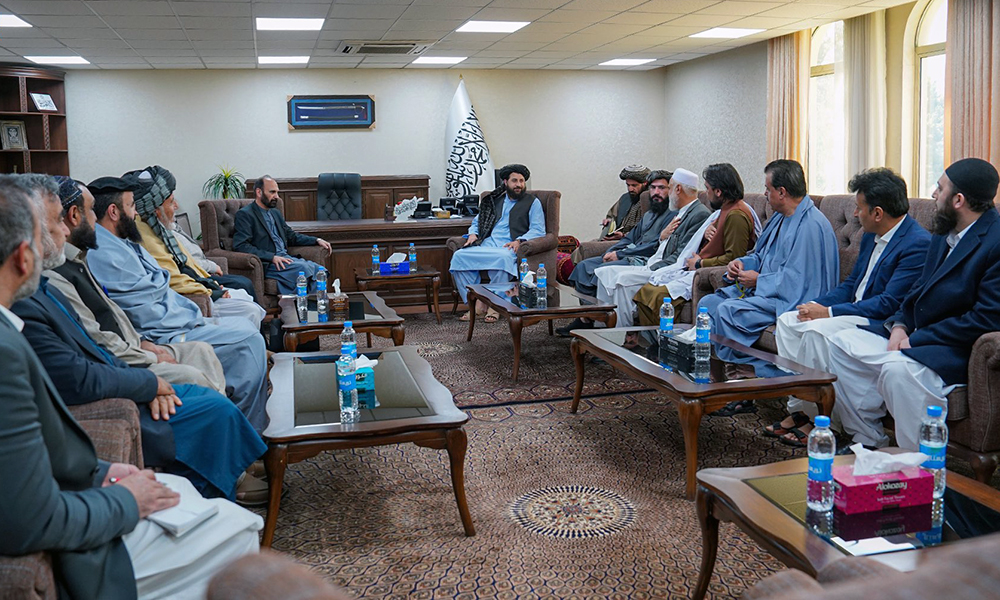
Representatives of the Union of Afghans living in Europe on Tuesday met with the ministers of defense and mining for talks on several issues.
Acting Minister of National Defense Mohammad Yaqoub Mujahid said in a meeting with union delegates that the current security situation in the country has provided an opportunity for everyone to participate in the progress of Afghanistan.
Mujahid added that there were still some problems in certain areas but that these will be removed.
In this meeting, Mujahid called Afghanistan the common home of all Afghans and said the problems in the country will be solved soon.
“The problems that exist in some issues will be solved soon; but there was nothing more than the security that has been revealed in this land today with the help of Allah and with the sacrifices of our people,” he was quoted in a statement as saying.
According to the statement, a number of Afghans, who only moved to the country after the Islamic Emirate’s takeover, expressed their satisfaction with the current situation in the country.
In addition, Shahabuddin Delawar, acting Minister of Mines and Petroleum, also met with union representatives and asked Afghans living abroad to return to Afghanistan and contribute to the country’s progress.
In this meeting, the Afghans living in Europe asked Delawar to provide better facilities to Afghans who want to invest in the country. The Ministry of Mines and Petroleum says that Delawar also asked the visiting delegation to return to Afghanistan and contribute to the country’s development.
Earlier, in a meeting with a number of other officials of the Islamic Emirate, including the political deputy of the Prime Minister and the Acting Minister of Foreign Affairs, this delegation emphasized the need to strengthen the system and provide work and education to Afghan girls and women.
Latest News
Regional developments require Afghanistan, China’s full coordination to protect interests: Muttaqi
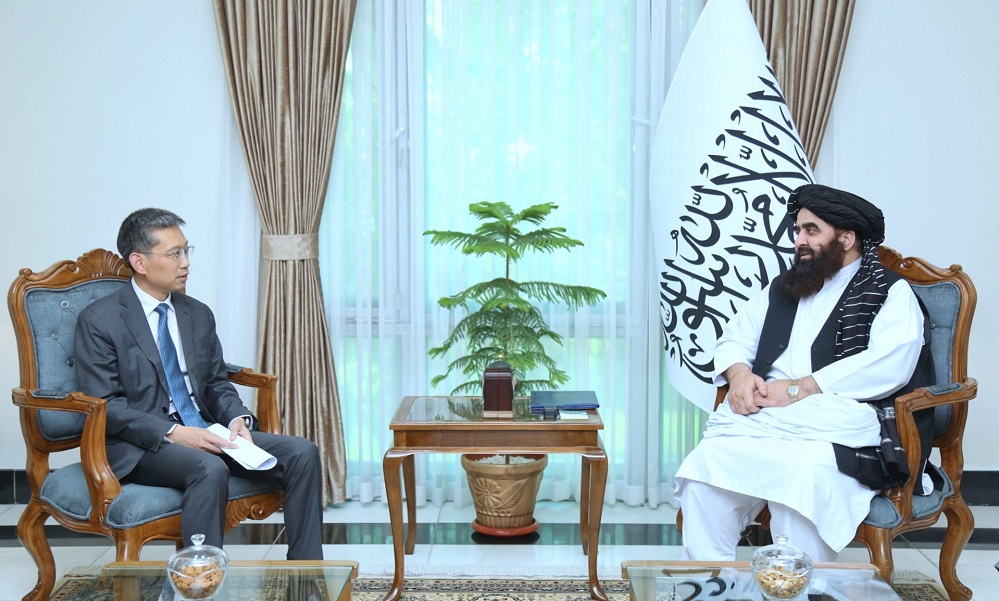
Acting Minister of Foreign Affairs Amir Khan Muttaqi has said that recent events and developments in the region require that Afghanistan and China continue their cooperation in full coordination so that they can protect their common interests.
Muttaqi stated this in a meeting with the Chinese ambassador in Kabul Zhao Xing.
The Ministry of Foreign Affairs said in a statement Tuesday that the two sides discussed bilateral political, economic and cultural cooperation between Afghanistan and China and the recent developments in the region.
Muttaqi expressed his satisfaction with the expansion of political, economic and cultural relations between the two countries and said that the Islamic Emirate has created good opportunities in the field of trade and investment.
He pointed out that the increase in the export of pine nuts to China and the progress in the Mes Aynak and Wakhan Corridor projects are clear examples of this policy of the Islamic Emirate.
According to the Ministry of Foreign Affairs’ statement, the Chinese ambassador considered the developments in various fields with Afghanistan as positive and added that he seeks to encourage Chinese businessmen and investors to play their role for long-term economic cooperation with Afghanistan.
He also said that his country is considering ways of bilateral cooperation and resources regarding Wakhan Corridor.
-

 Business5 days ago
Business5 days agoCommerce ministry inks 10 MoUs to boost development of small and medium-sized businesses
-

 Sport4 days ago
Sport4 days agoRashid Khan threatens BBL pullout after Australia postpones Afghanistan T20I series
-

 Latest News5 days ago
Latest News5 days agoOver 6,000 acres of land cleared of poppies in Badakhshan
-

 Latest News5 days ago
Latest News5 days agoMSF ‘deeply concerned’ over new phase of deportations of Afghans from Pakistan
-

 Sport3 days ago
Sport3 days agoAfghanistan Champions League kicks off with grand opening ceremony
-

 Latest News3 days ago
Latest News3 days agoPakistan’s frontiers minister stresses ‘dignified’ return of Afghan refugees
-

 Regional4 days ago
Regional4 days agoIran’s foreign minister downplays drone attack, says Tehran investigating
-

 Latest News4 days ago
Latest News4 days agoTen people killed by floods in Helmand








